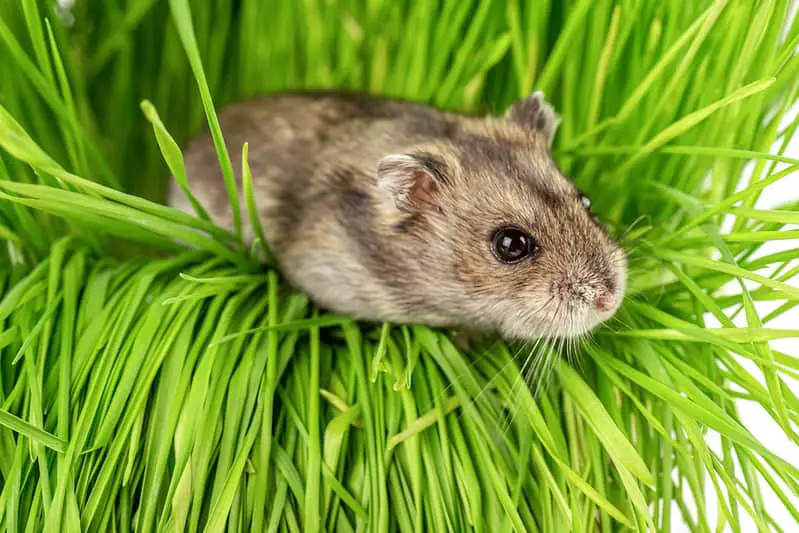Hamsters are fun, low-maintenance, and incredibly cute pets. The vast majority of hamsters spend their entire lives indoors, but there are some owners who are looking for adventure. They wonder if their hamster can play outside, or perhaps they even wonder if it can live outside permanently.
This is an interesting question. After all, certain rodents, such as rabbits, are kept outside quite often. But does the same apply to hamsters?
Unfortunately, if you’re planning on having your hamster live outdoors I have to disappoint you, it’s not possible. Hamsters are not suited to living outdoors because of the temperature and because it’s not safe for them. However, it is possible to let them play outside occasionally, as long as you take the proper precautions. To learn more, keep reading.

Housing your hamster outdoors is not a good idea
There are many reasons why someone might be interested in keeping their hamster outdoors. Perhaps they feel like the fresh air would be beneficial to their furry friend, or maybe their nocturnal nature and nightly antics make it hard for you to fall asleep.
Whatever the reason may be, you should know that hamsters are not capable of living outside. There are several reasons for this. The most important reason is temperature. Hamsters thrive at a temperature between 65 and 75 degrees Fahrenheit.
Indoors, it’s easy to control the temperature to make it suitable for your pet, but outside this is not the case. Getting too hot or too cold is very dangerous for your hamster. It can lead to them going into hibernation or even death.
Secondly, living outside is too stressful for them. Hamsters are tiny prey animals that have a lot to fear from the world. If you keep them in a cage outside they will be stressed out almost non-stop. They have very sensitive ears and can pick up on sounds that are inaudible to us humans. These sounds can stress them out immensely.
Lastly, depending on where you live, keeping your hamster outside is simply not safe. Many places in the world have at least some animals that would love to eat your furry friend as an afternoon snack. These can be snakes, lizards, birds, or cats and dogs. Some of these predators might find their way into your hamster’s cage, while others might simply lurk in front of the cage and make your hamster’s entire life incredibly scary.
Not to mention the fact that hamsters are excellent escape artists. If they manage to escape from their cage outside you can say farewell to them because you’ll never find them again. If they escape from their cage indoors, you have a much better chance of finding them again.
On the whole, hamsters should never live outside. It’s not good for them and they won’t be happy there. Make sure to keep them indoors.
Can hamsters play outdoors?

Now, we’ve discussed in detail why hamsters should live indoors, but what about playtime? Is it safe for them to play outside from time to time?
Luckily, they can indeed play outside for about 15 to 20 minutes, as long as you make sure that you follow some precautions.
First, make sure that the temperature outside is okay. On days that are too hot or too cold, you should never take your hamster outside to play because this can be extremely dangerous.
Secondly, make sure that you avoid placing your hamster in direct sunlight. Even days that might not seem too hot can be very hot in the sun. When your hamster plays outside, it’s best to let them do so in a shaded area.
Thirdly, make sure that you keep your hamster in its cage or playpen at all times. It might be tempting to let your hamster roam around on the grass for a little bit, but don’t do it! Your hamster will run away in no time and you’ll never be able to find it again. They’re very nimble and great at hiding.
Another important thing to keep into consideration is that Syrians need an outdoor cage with a maximum bar spacing of 1 cm, while smaller dwarf hamsters, such as Winter Whites, need a bar spacing that’s smaller than 8 millimeters. This is to prevent them from escaping through the bars.
Fourthly, make sure that you always keep an eye on them, do not let them in their cage outside unsupervised. It can happen that other animals will try to enter the cage to eat your hamster, so make sure that you always supervise and protect them.
Lastly, make sure that you check carefully that the patch of grass you place your hamster on (in its cage of course) has not been treated with any kinds of pesticides. Hamsters are intelligent and curious creatures that like to explore things by scent and taste.
Can hamsters go outside in a ball?
There’s a big debate on whether hamsters even enjoy being in balls in the first place. According to many sources, being in a ball is stressful for them because it restricts their senses and compromises their ability to gain information about their environment.
This can especially be a problem outside, as it’s a completely new environment. Hamsters already have an instinctual tendency to run away from open spaces, which being in a ball can prevent them from doing. On the whole, I’d recommend against letting your hamster play in a ball outside.
Do hamsters like going outside?
Not all hamsters enjoy the great outdoors. Some get very stressed and would prefer to spend their entire life inside. That’s completely fine, as hamsters do not need outside time in order to thrive. Other hamsters might actually enjoy the fresh air from time to time.
Our pets can’t talk to us, but they do say a lot with their body language. To figure out whether your hamster likes being outside or not it’s always good to look at signs of stress and relaxation. If they show signs of stress, such as cage biting, hyperactivity, hiding, teeth chattering, or skittishness, it’s reasonable to assume that they prefer being indoors.
If you notice these signs, take your hamster back inside as soon as possible so that it can calm down.
Final words
Hamsters can not live outside, but with the proper precautions, they can play outside from time to time. Some hamsters enjoy this novel experience where they get to smell, hear, and see new things that they’ve never seen before, while others get stressed and do not enjoy the experience at all.
Every hamster is different, and figuring out their personality and what they like/dislike is one of the most important things.
- How Long Do American Eskimo Dogs Live? Important Factors and Care Tips - September 29, 2023
- Do American Bulldogs Need Grooming? Essential Tips and Care Guidelines - September 29, 2023
- Do Bengal Cats Enjoy Playing? Essential Tips for Keeping Them Active - September 29, 2023